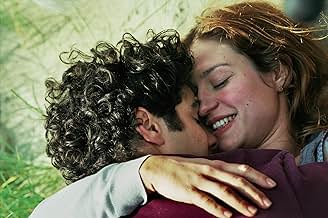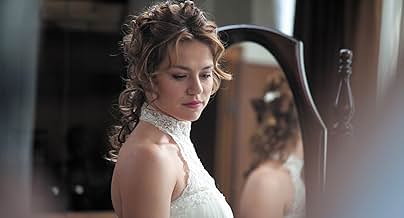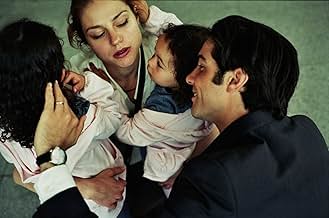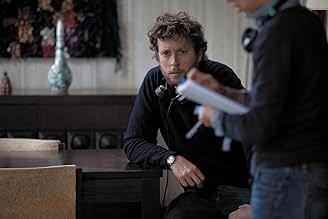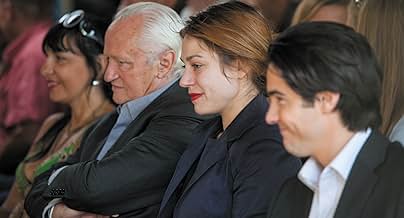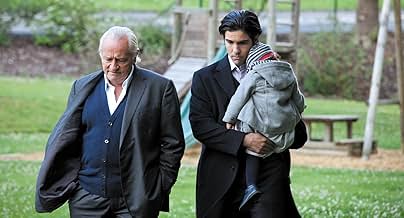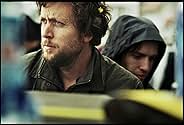VALUTAZIONE IMDb
6,8/10
3227
LA TUA VALUTAZIONE
Aggiungi una trama nella tua linguaHappy couple, will marry and have children under the roof of the benevolent Doctor. Little by little, relationships become complex, suffocating the couple and the family, who are unaware of ... Leggi tuttoHappy couple, will marry and have children under the roof of the benevolent Doctor. Little by little, relationships become complex, suffocating the couple and the family, who are unaware of the tragic end towards which they are headingHappy couple, will marry and have children under the roof of the benevolent Doctor. Little by little, relationships become complex, suffocating the couple and the family, who are unaware of the tragic end towards which they are heading
- Regia
- Sceneggiatura
- Star
- Premi
- 9 vittorie e 12 candidature totali
Recensioni in evidenza
Depression is a terrible thing. The opening scene of 'My Children' tells us that an awful thing has happened, and the rest of the movie provides the background to the tragedy. It's a slow-paced film, and for much of its length, it feels too slow-paced for its own plot: it's not easy to see how the status quo is going to descend into tragedy within the allotted time. In the event, the end is sudden and not directly provoked: the cause is rather internal, the final snapping of its protagonist amid inner despair. Nonetheless, depression can be induced by real-world causes, and the film is actually, aside from its dramatic conclusion, an intriguing study of a subtly abusive relationship between an elderly doctor who in effect adopted a Moroccan family. In return for his generosity, he sought control, more control than any one person should have over the lives of others. Director Joachim Lafosse strangely shoots many scenes through out-of-focus doorways, a stylistic tic that I didn't quite understand; but this a powerful study nonetheless, a disturbing portrait of a family life that is superficially idyllic, but somehow not right nonetheless
The film is directly inspired by the case of Geneviève Lhermitte, a Belgian woman who, in 2008, brutally murdered her five children.
What in the world drove this hitherto model mother to such a barbarous act... is the anguished question asked by writer-director Joachim Lafosse (also Belgian) in this intense if somewhat restrained drama. A question all the harder to answer when the deplorable "heroine" of this family tragedy was at a loss, as she put it, "to understand what has happened, for I still haven't understood. I acted the opposite way to what I thought."
Lafosse cannot provide THE answer, it goes without saying. How could he since the real-life murderess in person proved unable to understand herself? But he tries hard to come as close to the truth as possible. In any case, he refuses to condemn her. Instead, he describes thoroughly all the stages of the way of the cross she undergoes before committing her irreversible act.
Co-written with Matthieu Raynaert and Jacques Audiard's favorite screenwriter Thomas Bidegain, "A perdre la raison" indeed follows the various developments of the affair very realistically even if the names and a few details have been changed (after all this is a fiction work, not a documentary) : Geneviève has become Murielle and her husband is named Mounir instead of Bouchaib. Plus, the couple in the fiction has four children whereas they had five in the real situation. As for their evil genius, he is not Dr. Michel Schaar any longer, but Dr. André Pinget. Basically however, all the seeds of the tragedy sown in real life are present in the fiction and in it too the wild wind cannot but be reaped: once established the toxic relationships between Murielle (who craves the intimacy of a love nest), Mounir (whose gratefulness to his foster father lets him invade it) and André (who gives the couple everything but controls their lives from A to Z), the infernal machine is activated and – a constant in classic tragedy – nothing can stop it.
Such an approach will naturally be effective only if it rests on strong acting performances, which is fortunately the case here. Emilie Dequenne ("Rosetta", "La fille du RER") is deeply moving as Murielle, this Mother Courage - Mater Dolorosa turned Medea, while Tahar Rahim ("Un prophète", "Grand Central") translates to perfection Mounir's affectionate but weak temperament. As for Niels Arestrup ("Un prophète", "Diplomatie"), the formidable actor proves more menacing and terrifying than ever in the role of the couple's Nemesis hiding beneath a friendly exterior.
Quite a gripping work, "A perdre la raison" is a film experience you will find hard to forget. Both a cold analysis of a tragic news event and the sympathetic portrait of a desperate woman, it is one of the most impressive movies shown in 2012.
What in the world drove this hitherto model mother to such a barbarous act... is the anguished question asked by writer-director Joachim Lafosse (also Belgian) in this intense if somewhat restrained drama. A question all the harder to answer when the deplorable "heroine" of this family tragedy was at a loss, as she put it, "to understand what has happened, for I still haven't understood. I acted the opposite way to what I thought."
Lafosse cannot provide THE answer, it goes without saying. How could he since the real-life murderess in person proved unable to understand herself? But he tries hard to come as close to the truth as possible. In any case, he refuses to condemn her. Instead, he describes thoroughly all the stages of the way of the cross she undergoes before committing her irreversible act.
Co-written with Matthieu Raynaert and Jacques Audiard's favorite screenwriter Thomas Bidegain, "A perdre la raison" indeed follows the various developments of the affair very realistically even if the names and a few details have been changed (after all this is a fiction work, not a documentary) : Geneviève has become Murielle and her husband is named Mounir instead of Bouchaib. Plus, the couple in the fiction has four children whereas they had five in the real situation. As for their evil genius, he is not Dr. Michel Schaar any longer, but Dr. André Pinget. Basically however, all the seeds of the tragedy sown in real life are present in the fiction and in it too the wild wind cannot but be reaped: once established the toxic relationships between Murielle (who craves the intimacy of a love nest), Mounir (whose gratefulness to his foster father lets him invade it) and André (who gives the couple everything but controls their lives from A to Z), the infernal machine is activated and – a constant in classic tragedy – nothing can stop it.
Such an approach will naturally be effective only if it rests on strong acting performances, which is fortunately the case here. Emilie Dequenne ("Rosetta", "La fille du RER") is deeply moving as Murielle, this Mother Courage - Mater Dolorosa turned Medea, while Tahar Rahim ("Un prophète", "Grand Central") translates to perfection Mounir's affectionate but weak temperament. As for Niels Arestrup ("Un prophète", "Diplomatie"), the formidable actor proves more menacing and terrifying than ever in the role of the couple's Nemesis hiding beneath a friendly exterior.
Quite a gripping work, "A perdre la raison" is a film experience you will find hard to forget. Both a cold analysis of a tragic news event and the sympathetic portrait of a desperate woman, it is one of the most impressive movies shown in 2012.
The film sets out its stall very early, so we know within the first few minutes what we are about to see, but I spent ninety minutes in denial, hoping against all expectation that something would happen to change the course of the story.
The male characters are predictable without being cartoonish, but the female parts are outstanding. The Moroccan grandmother exemplifies the way the grandfather has been able to develop a God complex, critical of North African patriarchy while practicing it himself. It is the children's mother (Emilie Dequenne), though, who gives the most extraordinary performance. She is utterly compelling and places us, however unwillingly, into the position of the oppressed and abused. I am rarely a fan of child actors but Jade and Sohane could have been in a fly-on-the-wall documentary, so natural did they appear.
The end had a sense of horrific inevitability handled with the sympathetic discretion of Elvira Madigan, with the soundtrack adding to that comparison.
Staggeringly heartfelt, disturbing and painfully real. Truly devastating.
The male characters are predictable without being cartoonish, but the female parts are outstanding. The Moroccan grandmother exemplifies the way the grandfather has been able to develop a God complex, critical of North African patriarchy while practicing it himself. It is the children's mother (Emilie Dequenne), though, who gives the most extraordinary performance. She is utterly compelling and places us, however unwillingly, into the position of the oppressed and abused. I am rarely a fan of child actors but Jade and Sohane could have been in a fly-on-the-wall documentary, so natural did they appear.
The end had a sense of horrific inevitability handled with the sympathetic discretion of Elvira Madigan, with the soundtrack adding to that comparison.
Staggeringly heartfelt, disturbing and painfully real. Truly devastating.
A KVIFF screening, from French director Joachim Lafosse, before now the film has won a BEST ACTRESS award (for Émilie Dequenne) in UN CERTAIN REGARD competition in this year's Cannes.
It is an unsettling drama concerns a tragedy which would be quite a mind-shocker. The film begins with the wife lying in the hospital bed (clearly after some severe accident) and mumbling that her children should be buried in Morocco, so during the subsequent truth-revealing narrative, viewers are practically preparing ourselves to undertake a tremendous calamity (my speculation is a car accident), but the film will deliver a much stronger and crueler blow, the actual long-takes of the massacre are done in an eerily tranquil restraint (considerably withdrawn from the actual execution).
The foci are on the bizarre triangular relationship among three people, Mounir, a young Moroccan man and his French wife Murielle, live with elderly André a rich French doctor who had a paper marriage arrangement with Mounir's mother, so he could bring Mounir with him, and provide a job for him to work in his private clinic. So technically Mounir-André's quasi father- son bond has a deeper root (than Murielle, the clear intruder could imagine) although they are no blood linkage. Later, when their children consequently arriving in this world, step-by-step Murielle finds herself suffocated by the temporal life (possibly postpartum depression), and eagerly sways Mounir to go back to Morocco with their family, to start their life anew. But thing is slipping to an abyss when André cannot risk losing them and Mounir relies too much on him (both economically and psychologically) as well. Until the confrontation between Murielle and André finally occurs, the tragedy is inescapable.
A heavy string score is predestined to the solemn tenor, the film is a trifle long-haul (a 111 minute running time) and the transitions of the characters' mental activities are either too abrupt or too hackneyed, but Émilie Dequenne for sure has been splendidly extraordinary in her devastating role, her self-destroy interpretation is powerful enough to propel the story against its ill-fated destiny. The A PROPHET (2009, a 9/10) pair, Tahar Rahim and Niels Arestrup are sharing their leading status as the other two angles of the triangle hazard, and overtly the latter has a meatier presence.
There is a chafed undertone against the main plot, which I dare not to sidestep, the legality of paper marriage may not be the crux behind the tragedy, but nevertheless plays an influential part of the contemporary immigrant quandary.
It is an unsettling drama concerns a tragedy which would be quite a mind-shocker. The film begins with the wife lying in the hospital bed (clearly after some severe accident) and mumbling that her children should be buried in Morocco, so during the subsequent truth-revealing narrative, viewers are practically preparing ourselves to undertake a tremendous calamity (my speculation is a car accident), but the film will deliver a much stronger and crueler blow, the actual long-takes of the massacre are done in an eerily tranquil restraint (considerably withdrawn from the actual execution).
The foci are on the bizarre triangular relationship among three people, Mounir, a young Moroccan man and his French wife Murielle, live with elderly André a rich French doctor who had a paper marriage arrangement with Mounir's mother, so he could bring Mounir with him, and provide a job for him to work in his private clinic. So technically Mounir-André's quasi father- son bond has a deeper root (than Murielle, the clear intruder could imagine) although they are no blood linkage. Later, when their children consequently arriving in this world, step-by-step Murielle finds herself suffocated by the temporal life (possibly postpartum depression), and eagerly sways Mounir to go back to Morocco with their family, to start their life anew. But thing is slipping to an abyss when André cannot risk losing them and Mounir relies too much on him (both economically and psychologically) as well. Until the confrontation between Murielle and André finally occurs, the tragedy is inescapable.
A heavy string score is predestined to the solemn tenor, the film is a trifle long-haul (a 111 minute running time) and the transitions of the characters' mental activities are either too abrupt or too hackneyed, but Émilie Dequenne for sure has been splendidly extraordinary in her devastating role, her self-destroy interpretation is powerful enough to propel the story against its ill-fated destiny. The A PROPHET (2009, a 9/10) pair, Tahar Rahim and Niels Arestrup are sharing their leading status as the other two angles of the triangle hazard, and overtly the latter has a meatier presence.
There is a chafed undertone against the main plot, which I dare not to sidestep, the legality of paper marriage may not be the crux behind the tragedy, but nevertheless plays an influential part of the contemporary immigrant quandary.
Few artists can do what Mister Arestrup does.A character actor in the noblest sense of the word,he never gives you the impression he overplays ;yet,he can be frightening ,makes you blood run cold ,while remaining extremely restraint.In the five last years ,his two portrayals (the wine-grower in "Tu Seras Mon Fils " ,and the stepfather in "A Perdre La Raison") are among the most impressive in the contemporary French cinema.
A Young couple (she is a French Teacher,he is a Morrocan immigrant)sees their life ,slowly but inexorably ,elude them.The Young man's stepfather he calls his Godfather provides them with everything a Young couple may wish :no problem to make ends meet .But the lack of intimacy becomes hard to bear for the Young woman who would like to share a true home with her husband.But the wealthy man does not want his protégés to run away and he 's using financial blackmail as well as emotional blackmail.They are under "tutelage" :the Young man ,who seems immature sees his protector as a merciful God but his wife is not prepared to accept it.This house is not big enough for the three of us.
It's putting off the inevitable;the last scene ,showing the house of "happiness" ,filmed in fixed camera shot ,could not have been more harrowing.
A Young couple (she is a French Teacher,he is a Morrocan immigrant)sees their life ,slowly but inexorably ,elude them.The Young man's stepfather he calls his Godfather provides them with everything a Young couple may wish :no problem to make ends meet .But the lack of intimacy becomes hard to bear for the Young woman who would like to share a true home with her husband.But the wealthy man does not want his protégés to run away and he 's using financial blackmail as well as emotional blackmail.They are under "tutelage" :the Young man ,who seems immature sees his protector as a merciful God but his wife is not prepared to accept it.This house is not big enough for the three of us.
It's putting off the inevitable;the last scene ,showing the house of "happiness" ,filmed in fixed camera shot ,could not have been more harrowing.
Lo sapevi?
- QuizThe official entry of Belgium to the Best Foreign Language Film at the 85th Academy Awards 2013.
- ConnessioniReferences Rocky III (1982)
I più visti
Accedi per valutare e creare un elenco di titoli salvati per ottenere consigli personalizzati
- How long is Our Children?Powered by Alexa
Dettagli
- Data di uscita
- Paesi di origine
- Siti ufficiali
- Lingue
- Celebre anche come
- Perder la razón
- Luoghi delle riprese
- Dudelange, Lussemburgo(town hall for the wedding ceremony)
- Aziende produttrici
- Vedi altri crediti dell’azienda su IMDbPro
Botteghino
- Lordo Stati Uniti e Canada
- 23.203 USD
- Fine settimana di apertura Stati Uniti e Canada
- 5500 USD
- 4 ago 2013
- Lordo in tutto il mondo
- 700.215 USD
- Tempo di esecuzione
- 1h 51min(111 min)
- Colore
- Mix di suoni
- Proporzioni
- 2.35 : 1
Contribuisci a questa pagina
Suggerisci una modifica o aggiungi i contenuti mancanti



